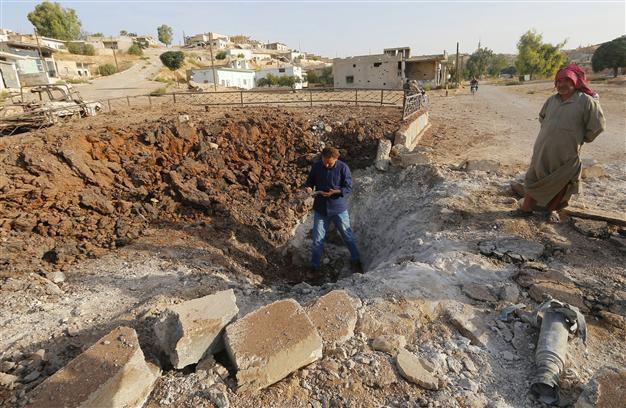Russia backs Syrian forces in major assault on insurgents
BEIRUT - Reuters

Men stand along a crater caused by what activists said was a Russian air strike in Latamneh city on Wednesday, in the northern countryside of Hama, Syria October 2, 2015. Reuters Photo
Russia and Syria carried out what appeared to be the first major coordinated assaults on Syrian insurgents on Oct. 7, targeting rebels in the west rather than Islamic State of Iraq and the Levant (ISIL) militants, a monitor said.
The combined assault hit towns close to the main north-south highway that runs through major cities in the mainly government-held west of Syria, said the Syrian Observatory for Human Rights, a British-based group which tracks the conflict via a network of sources within the country.
Ground attacks by Syrian government forces and their militia allies using heavy surface-to-surface missile bombardments hit at least four insurgent positions and there were heavy clashes, the head of the Observatory Rami Abdulrahman said.
Syria's northern neighbour Turkey summoned Russia's ambassador for the third time in four days over what it said were repeated violations of its air space by Russian warplanes since their air strikes began last week.
Russia's air campaign in Syria, at a time when relations with the West are at a post-Cold War low over Ukraine, has caught Washington and its allies on the back foot and risks an incident between Russian and U.S. warplanes, now operating in the same country for the first time since World War Two.
Moscow says it shares the West's aim of preventing the spread of ISIL militants who have seized much of Syria since civil war grew out of anti-government protests in 2011.
But fighters on the ground and Western nations have said Russia has mainly targeted rebel groups that have seized government-held areas in western Syria, and is aimed at shoring up President Bashar al-Assad rather than combating hard-liners.
Syrian state media made no mention of the coordinated attacks, saying instead that Russian aircraft had targeted ISIL positions in the Aleppo countryside, where its fighters hold territory.
State television said government forces had targeted militants at the Sha'ar gas field and village of Qaryatain in Homs province, as well as Atshan, a town to the east of Russian air force bombardments in Hama province on Oct. 7.
Russia's Defence Minister Sergei Shoigu told President Vladimir Putin during a televised meeting on Oct. 7 that four Russian warships in the Caspian Sea had launched 26 rockets at ISIL in Syria.
Putin replied that it was too early to talk about the results of Russia's operations in Syria and ordered Shoigu to continue cooperation with the United States, Turkey, Saudi Arabia, Iran and Iraq on the crisis.
Turkish Prime Minister Ahmet Davutoğlu said only two of 57 Russian air strikes in Syria so far had hit ISIL, while the rest had been against the moderate opposition, the only forces fighting the hard-line insurgents in northwestern Syria.
"If (the Syrian regime) weakens the opposition, it will strengthen Islamic State," he said, warning of the risk of a new flow of refugees, who have left Syria in their millions, overwhelming neighbouring countries and causing a crisis in the European Union.
But in Iraq, the head of parliament's defence and security committee said Baghdad may request Russian air strikes against ISIL on its soil soon and wants Moscow to have a bigger role than Washington in fighting the group.
Iraq's government and powerful Iranian-backed Shi'ite militias question the United States' resolve in fighting ISIL militants, who control a third of the country, saying U.S.-led coalition air strikes are ineffective.
Russian air strikes against the government's opponents in Syria have raised hopes in Baghdad that Russia could become an effective partner against the ultra-hardline group.
"We might be forced to ask Russia to launch air strikes in Iraq soon ... and that depends on their success in Syria," Hakim al-Zamili told Reuters.
Davutoğlu said he did not want the conflict in Syria turning into a crisis between Russia and NATO nor into a Russian-Turkish dispute, but that Turkey would not compromise on the security of its borders or air space.
NATO Secretary-General Jens Stoltenberg said on Oct. 6 the violations of Turkish air space appeared to be deliberate and were "extremely dangerous".
The Western defence alliance said on Oct. 6 it had reports of a substantial Russian military build-up in Syria, including ground troops and ships in the eastern Mediterranean.
Abdulrahman said Russia appeared to have stuck to air support on Oct. 7. The assault followed a report by Reuters last week that allies of Assad, including Iranians, were preparing to recapture territory lost by the government to rebels in rapid advances this year.
"There is no information yet of any (government) advances on the ground, but the air strikes have hit vehicles and insurgent bases," Abdulrahman said. A regional source familiar with the military situation in Syria said forces including Hezbollah fighters were taking part in the ground attack against four rebel-held areas in western Syria.
The Observatory said Russia's strikes targeted the towns of Kafr Zita, Kafr Nabudah, al-Sayyad and the village of al-Latamneh in Hama province and the towns of Khan Shaykhun and Alhbit in Idlib. Most of Idlib province is held by an alliance of al Qaeda's Syria wing Nusra Front and other Islamist groups.
Hezbollah-run al-Manar television said in a newsflash that "an operation by the Syrian army started in a number of villages and towns in the northern countryside of Hama province".
A video posted by the media office of an opposition group in Hama province on YouTube purported to show heavy rocket strikes on Oct. 7 hitting an areas in the northern Hama countryside.
Reuters could not immediately independently corroborate the footage, which showed several large clouds of grey smoke rising over an area with buildings and trees in the morning light.
